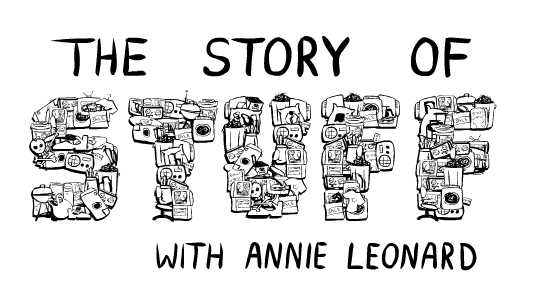17 May
Posted by kari.petroschmidt

So you can find The Story of Stuff here. What I love about this video is that it really makes you think about all your shit. Where it comes from, the value you invest in it and the implications your consumption has on the rest of the world. Here’s some sound-bites. – We’re running out of resources – in the past three decades alone ONE THIRD of the planet’s resources have been used up. In the US alone 40% of the waterways are undrinkable, the country only has 4% of its original forest left. US = 5% of the world, using 30% of its resources. Using resources from the third world. Losing 2000 trees a minute. 1000 synthetic chemicals in our stuff. Human breast milk has highest level of contaminants. DISASTER! PANIC! TERROR!
– EXTERNALIZED COST: “… the real costs of making stuff aren’t captured in the price, in other words we aren’t paying for what we buy… I didn’t pay for [this] radio… these people paid with the loss of their natural resource space… increasing cancer and asthma rates… kids in the Congo paid with their future, 30% of kids in the Congo have dropped out of school to mine coltan, a metal we need for our cheap and disposable electronics… these people paid by having to buy their own health insurance. All along this system people pitched in so I could get this radio for $4.99 ”
– THE GOLDEN ARROW OF CONSUMPTION – “99% of the stuff we buy is trashed within six months… the average US person consumes twice as much as we used to before WWII…” It was planned – “Our enormously productive economy demands that we make consumption our way of life, that we convert the buying and use of goods into rituals, that we seek our spiritual satisfaction, our ego satisfaction in consumption. We need things consumed, burned up, replaced at an ever-accelerating rate.” Our ultimate purpose is to produce and purchase more consumer goods = PLANNED AND PERCEIVED OBSOLESCENCE.
Planned: When goods are made to break within a certain time frame, so consumers will buy more and contribute to the economy. Perceived: When goods are perceived to be useless as they go out of fashion, so consumers will buy more and contribute to the economy.
“We have less leisure time than before feudal society.”
You could say animations make this a bit simplistic and yeeah I see your point. But also, colours and shapes, we love them. All this stuff is boring and overwhelming as hell otherwise. Granted, the system is more complicated than what Leonard relates, human psychology is more complicated than that, how we change this system is going to be more complicated than that. But The Story of Stuff is an excellent base from which to start – if you don’t know about planned or perceived obsolescence, for instance…
The end is a bit twee – “we can change the world.” I much prefer this :
| Posted on |
|---|
| 17 – May – 2012 |